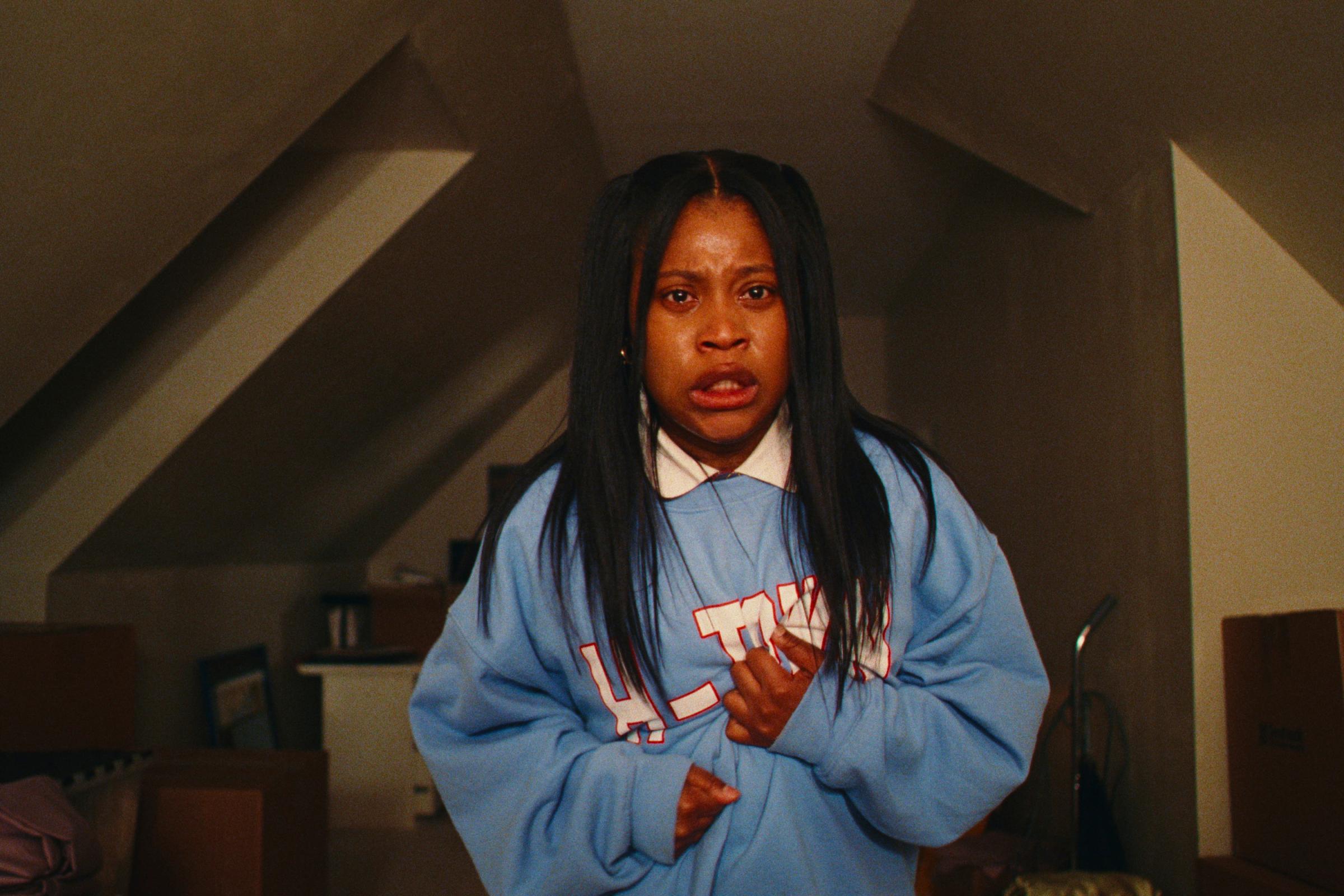Engaging in any form of discourse around the stories Donald Glover tells can often feel like stepping into an expertly laid trap. This goes double for his latest project, Swarm, an Amazon horror comedy steeped in toxic pop-music standom that will be available to stream in full on March 17. Be that as it may, well, here we go.
For reasons that quickly become apparent, the name Beyoncé is never spoken in the show. But co-creators Glover and Janine Nabers, an Atlanta and Watchmen alum who also serves as showrunner, take pains to convey that she is the basis for their fictional megastar, Ni’jah (Nirine S. Brown). Born in Houston, where Swarm opens, Ni’jah surprise-releases an instant-classic visual album, headlines a major music festival, is married to a famous rapper, and, in some of her most iconic imagery, rides a white horse. Her stans, the Swarm, use the bee emoji on social media, just like the BeyHive. The myths and rumors of their world are identical to the ones Beyoncé fans pass around. Also, each episode opens with the following onscreen text: “This is not a work of fiction. Any similarity to actual persons, living or dead, or events, is intentional.”
In what Glover and Nabers have described as a pointed response to sanitized depictions of Black women in popular entertainment—one that makes the show both compelling and, to my mind, ultimately unsuccessful—Swarm’s protagonist couldn’t be more different from Beyoncé. Awkward, immature, and obsessively devoted to her idol Ni’Jah, Dominique Fishback’s Dre is a young woman with the twitchy bearing of a feral child. The first thing we see her do is rip open an envelope containing a fresh credit card, activate her account, and throw down $3600 that she clearly does not have on a pair of Ni’jah tickets. It’s unhinged but also kind of sweet that she’d consign herself to years of debt in order to surprise her beloved roommate, Marissa (Beyoncé protégée Chloe Bailey, of sister R&B duo Chloe x Halle), with premium seats on her birthday.

Dre and Marissa grew up together, bonding over their shared love for hometown hero Ni’jah as foot soldiers of the Swarm. But while Dre has remained stuck in an apparently eternal preadolescence, Marissa is growing up. She has other friends, a boyfriend (Damson Idris) Dre can’t stand, and a budding career as a makeup artist. As Marissa shows signs of disengaging from the woman she calls her “number one,” Dre’s already-tenuous grip on reality starts to slip. By the end of episode one, she’s embarked upon a cross-country journey of deranged fandom and violence that is also an unconscious quest, of sorts, for belonging.
For roughly half of the seven-episode season, it seems as though the creators are making a simplistic horror comedy about the psychopathic undertones of stan culture. While that term—and a social-media landscape that fosters stans’ scariest attacks—are contemporary, the obsessed-fan horror trope dates back decades, to movies like Misery and The Fan. That Swarm remains reasonably engaging throughout its first three episodes is a credit to Fishback, also a producer, who has become one of the most captivating young talents in Hollywood. She not only moves seamlessly between innocence and ferociousness, making Dre come across as pitiful or terrifying or absolutely alien, but also captures those aspects of the character at war inside her, without uttering a word. It’s as riveting a performance as I’ve seen on TV.
Glover has earned viewers’ patience, and although it takes too long to get there, Swarm eventually arrives at more ambitious themes. Along with character types familiar from Atlanta—the condescending “anti-racist” white woman, the defensive crouch of the bourgeois Black family—and layered guest appearances from pop royalty like Billie Eilish and Paris Jackson (daughter of Michael), the series pokes holes in the glib template of contemporary true crime, with its predetermined heroes, villains, and pop-psychological meaning making.

The volume of Beyoncé references seems willfully incendiary—if not outright malicious—at first. But Glover and Nabers, to their credit, are up to more than nihilistic stansploitation. In episodes like “Black Bieber,” “Champagne Papi,” and “Born 2 Die,” Atlanta explored how the personas of real musicians (Justin Bieber, Drake, and D’Angelo, respectively) interact with pop culture, shaping half-conscious fantasies and nightmares and expectations that speak volumes on such elemental phenomena as race, fame, and romance. In the case of Swarm, the creators have talked about wanting to critique what they (and a Twitter user whose post helped spark the idea) see as too many overly reverent media representations of Black women as glamorous, invincible savior-slash-superheroes. No pop-star profile fits the latter description like that of the famously flawless Beyoncé, whose work is often cited as the apotheosis of Black womanhood.
The point of Dre, I think, is that despite also being a Black woman from Houston, she represents an inversion of everything Beyoncé symbolizes. Which makes the character a reminder that the category Black woman is no more monolithic than the category white men, and that it’s unhealthy to erase the many Black, female experiences that don’t resemble the righteousness of “Formation” or the rapture of “Drunk in Love.” Together, Beyoncé—sorry, Ni’jah—and Dre are yin and yang: one goddess-like, the other monstrous, both halves necessary to make a whole.
How effective you find this allegory will depend, in part, on how much you agree that the archetypal Black woman in entertainment is now a paragon of perfection. While we certainly see a lot of powerful and serene Black women on post-Shonda TV, Hollywood still disproportionately depicts Black women as violent or sexually objectified, and old stereotypes like the “Jezebel” persist. I also found it hard to get past certain—pat at best, narrow-minded at worst—ideas that come up in the show about sexuality, gender, and (although the creators do complicate this element somewhat) the kind of upbringing that might have yielded a person as strange as Dre. As a showcase for Fishback, Swarm is ideal. As cultural criticism, it can be intriguing and occasionally profound. But in its psychological underpinnings, the show conflates identity with pathology in some truly facile, potentially destructive ways. Although this is hardly the only charge that could put Glover in the crosshairs of the BeyHive, it’s the one that makes me doubt Swarm was worth the trouble.
Correction March 15
The original version of this story misstated Dominique Fishback’s behind-the-camera role in The Swarm. She is a producer, not an executive producer.
More Must-Reads from TIME
- Donald Trump Is TIME's 2024 Person of the Year
- Why We Chose Trump as Person of the Year
- Is Intermittent Fasting Good or Bad for You?
- The 100 Must-Read Books of 2024
- The 20 Best Christmas TV Episodes
- Column: If Optimism Feels Ridiculous Now, Try Hope
- The Future of Climate Action Is Trade Policy
- Merle Bombardieri Is Helping People Make the Baby Decision
Contact us at letters@time.com